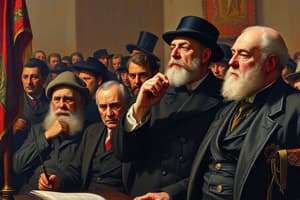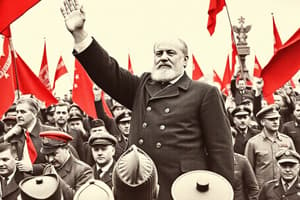Podcast
Questions and Answers
Which of the following factors did Lenin use to consolidate his power in Russia?
Which of the following factors did Lenin use to consolidate his power in Russia?
- Unification and Organization (correct)
- Charismatic Leadership (correct)
- Force (correct)
- Foreign Policy (correct)
- Propaganda (correct)
- Legal Methods (correct)
Lenin was a staunch believer in democracy and the power of the people's vote, as evidenced by his reliance on the Constituent Assembly.
Lenin was a staunch believer in democracy and the power of the people's vote, as evidenced by his reliance on the Constituent Assembly.
False (B)
What was the name of Lenin's secret police force, established in 1917?
What was the name of Lenin's secret police force, established in 1917?
Cheka
What was the name of the policy that allowed Lenin to focus on fighting the domestic civil war?
What was the name of the policy that allowed Lenin to focus on fighting the domestic civil war?
Which of the following decrees championed the rights of workers?
Which of the following decrees championed the rights of workers?
Which of the following was a characteristic of the White movement during the Russian Civil War?
Which of the following was a characteristic of the White movement during the Russian Civil War?
What was the term used by the Bolsheviks to refer to their political and economic system during the Russian Civil War?
What was the term used by the Bolsheviks to refer to their political and economic system during the Russian Civil War?
The Bolsheviks used 'Red Terror' to punish only those considered to be dangerous threats to the revolution.
The Bolsheviks used 'Red Terror' to punish only those considered to be dangerous threats to the revolution.
What was the name of the governing body that Lenin led, consisting entirely of Bolsheviks?
What was the name of the governing body that Lenin led, consisting entirely of Bolsheviks?
Flashcards
Lenin's Charismatic Leadership
Lenin's Charismatic Leadership
Lenin's ability to inspire and motivate people, crucial for consolidating power, even if popular support was limited.
Soviet Democracy
Soviet Democracy
Lenin believed in a more direct form of democracy through soviets, bypassing traditional elections.
Use of Force (Cheka)
Use of Force (Cheka)
Lenin's use of the Cheka, the secret police, to eliminate opposition, including arrests and executions.
Red Terror
Red Terror
Signup and view all the flashcards
Decree on Land
Decree on Land
Signup and view all the flashcards
Decree on Workers' Control
Decree on Workers' Control
Signup and view all the flashcards
Decree on Justice
Decree on Justice
Signup and view all the flashcards
Decree on Women
Decree on Women
Signup and view all the flashcards
Sovnarkom
Sovnarkom
Signup and view all the flashcards
War Communism
War Communism
Signup and view all the flashcards
Treatment of Opposition
Treatment of Opposition
Signup and view all the flashcards
Propaganda
Propaganda
Signup and view all the flashcards
Treaty of Brest-Litovsk
Treaty of Brest-Litovsk
Signup and view all the flashcards
Democratic Centralism
Democratic Centralism
Signup and view all the flashcards
Class System Abolition
Class System Abolition
Signup and view all the flashcards
Purge of Bureaucracy
Purge of Bureaucracy
Signup and view all the flashcards
White Army
White Army
Signup and view all the flashcards
Foreign Policy Impact
Foreign Policy Impact
Signup and view all the flashcards
Study Notes
Lenin's Consolidation of Power
- Lenin's methods for consolidating power included charismatic leadership, force, legal methods, propaganda, foreign policy, and unification/organization.
Charismatic Leadership
- Lenin, despite only achieving 24% of the vote, asserted the supremacy of the soviets representing a more direct democracy compared to traditional elections.
- He fostered a perception of a dedicated and determined leader, inspiring troops to fight even without hope and saving Petrograd from the Whites.
- Trotsky's communication and military strategy played a crucial role in securing Bolshevik victory.
Force
- Lenin used the Cheka (secret police) for widespread arrests, imprisonment, and executions against opposition groups such as social revolutionaries.
- The Cheka, under Felix Dzerzhinsky, expanded rapidly, employing extreme force to suppress opposition and maintain control.
- The "Red Terror" involved mass executions of suspected "class enemies," including members of opposing political parties.
- Enforcement of grain requisitioning through force was another aspect of applying brutal measures.
Legal Methods
- Lenin's regime implemented decrees aimed at changing societal structures:
- Land Decree: Abolished private land ownership and granted land seized from the gentry to peasants, creating a powerful base of peasant support.
- Workers' councils: Granted workers control over industrial aspects like pay, hiring, dismissals, and management oversight in factories. This also aimed to garner labor support by removing class ranks and appealing to common ideals.
- Justice system: Established people's courts with judges often lacking formal training, focusing on revolutionary ideals rather than legal precedent.
- Women's rights: Granted women equal property rights and introduced civil marriages alongside divorce, enhancing public perception of equality and fairness, and garnering support.
- Transition to state capitalism: Lenin strategically aimed to gradually control the economy, anticipating greater worker control in the future.
Propaganda
- The Bolsheviks used propaganda to portray themselves as defenders of the nation, gaining loyalty and morale among troops.
- Propaganda also reached remote areas in an effort to spread their influence.
Foreign Policy
- The Treaty of Brest-Litovsk, a decisive foreign policy measure, allowed the Bolsheviks to concentrate on their internal conflicts, gaining a strategic advantage and detaching them from war with other nations.
Unification and Organization
- The Bolsheviks consolidated their power via decisive leadership and a powerful, cohesive political party.
- The Whites lacked unity, having varied ideologies and struggles with working across different groups, which facilitated the Bolsheviks' success.
Treatment of Opposition
- Restrictions on the press and suppression of opposition publications were implemented.
- The Bolsheviks' forceful responses to opposition from the left-wing SR, Kadets, Mensheviks, and other groups contributed to the consolidation of their control.
- Purges of the Bureaucracy removed adversaries in the name of progress.
Studying That Suits You
Use AI to generate personalized quizzes and flashcards to suit your learning preferences.




